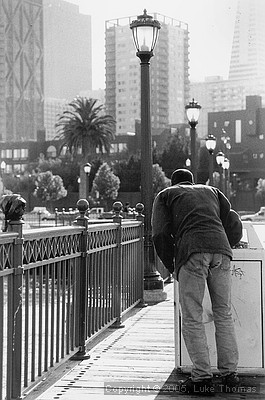
A homeless man sifts trash cans in San Francisco. File photo by Luke Thomas
By Judi Iranyi
March 29, 2018
As a former member of the San Francisco Shelter Monitoring Committee and a former Social Worker at the Homeless Advocacy Project, I have seen first hand the need for more supportive housing for those with mental and physical health conditions. Actually, anyone living on the street for any length of time is bound to develop a mental or physical problem. The mentally ill and those with physical conditions should be a priority in any plan to homelessness in San Francisco.
My husband and I arrived in San Francisco in 1971. Since at least that time, getting the homeless into housing or shelters has been a concern for every administration. Yet, the number of homeless keeps increasing from about 5,376 in 2000 to about 7,499 in 2017.
The San Francisco 2017 Homeless Count & Survey showed a homeless count of 7,499. More than two-thirds of this number (68% or 5,099) reported one or more health conditions. Over half of respondents (53% or 3,974) reported their condition limited their ability to take care of personal matters or to get and keep a job. These conditions include a psychiatric or emotional condition, or Post-Traumatic Stress Disorder (PTSD), a chronic health problem, drug or alcohol abuse, a physical disability, a traumatic brain injury, and an AIDS or HIV related illness.
Because people with chronic mental illness and/or addiction and/or physical health condition are often low income, rent subsidies are necessary to cover operating and maintenance costs of the housing units. Also, some mentally ill people require supportive services to maintain their housing and stabilize their lives.
Laura’s Law allows counties to seek court-ordered patient help for those with serious mental disorders. It enables law enforcement, mental health officials or family members to bring an individual with serious mental illness before a judge, where the individual would have the opportunity to voluntarily accept an outpatient treatment program, working with caseworkers. If the individual then quits the program, a judge can order more structured treatment, including conservatorship. However, conservatorships require rooms and beds.
In the March 2017 Assisted Outpatient Treatment (AOT) Program Report, the Program received 268 calls, 135 for referral and 60 were considered eligible for AOT participation. Clearly this is but a drop in the bucket for the number of homeless mentally ill in the City. Presently, there is a 54-locked psychiatric beds at St. Mary’s Medical Center and 47 at Zuckerberg San Francisco General Hospital. Again, this is hardly enough to meet expected needs.
While each mayoral candidate has listed homelessness as a priority, the new mayor should begin their administration by getting those homeless with mental and health conditions off the streets. But it will take time and money.


 The Hunger Site
The Hunger Site
No Comments
Comments for Giving Priority to Homeless with Mental and Health Conditions are now closed.